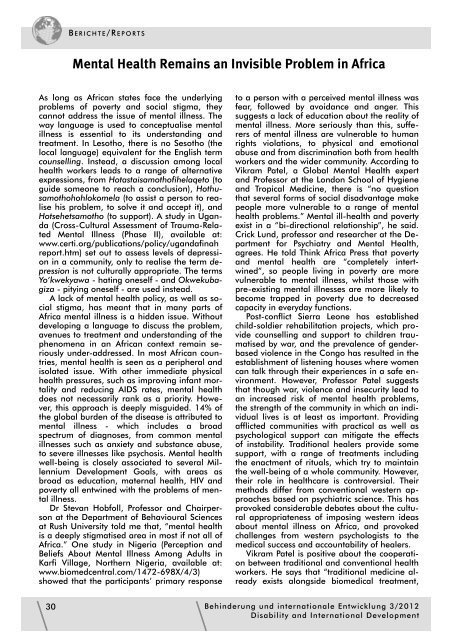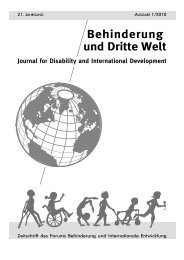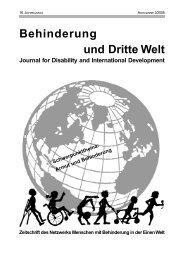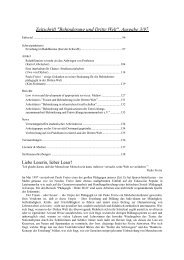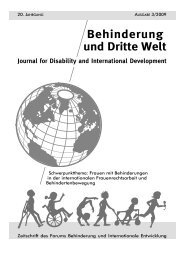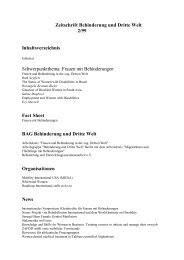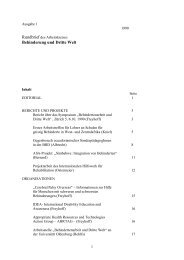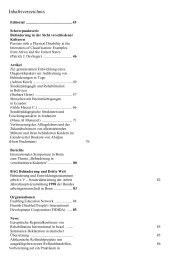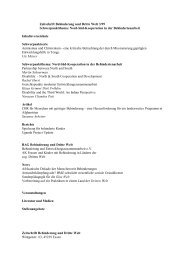Behinderung und internationale Entwicklung Disability and ...
Behinderung und internationale Entwicklung Disability and ...
Behinderung und internationale Entwicklung Disability and ...
Create successful ePaper yourself
Turn your PDF publications into a flip-book with our unique Google optimized e-Paper software.
B ERICHTE/REPORTSMental Health Remains an Invisible Problem in AfricaAs long as African states face the <strong>und</strong>erlyingproblems of poverty <strong>and</strong> social stigma, theycannot address the issue of mental illness. Theway language is used to conceptualise mentalillness is essential to its <strong>und</strong>erst<strong>and</strong>ing <strong>and</strong>treatment. In Lesotho, there is no Sesotho (thelocal language) equivalent for the English termcounselling. Instead, a discussion among localhealth workers leads to a range of alternativeexpressions, from Hotastaisamothofihelaqeto (toguide someone to reach a conclusion), Hothusamothohohlokomela(to assist a person to realisehis problem, to solve it <strong>and</strong> accept it), <strong>and</strong>Hotsehetsamotho (to support). A study in Ug<strong>and</strong>a(Cross-Cultural Assessment of Trauma-RelatedMental Illness (Phase II), available at:www.certi.org/publications/policy/ug<strong>and</strong>afinahreport.htm) set out to assess levels of depressionin a community, only to realise the term depressionis not culturally appropriate. The termsYo‘kwekyawa - hating oneself - <strong>and</strong> Okwekubagiza- pitying oneself - are used instead.A lack of mental health policy, as well as socialstigma, has meant that in many parts ofAfrica mental illness is a hidden issue. Withoutdeveloping a language to discuss the problem,avenues to treatment <strong>and</strong> <strong>und</strong>erst<strong>and</strong>ing of thephenomena in an African context remain seriously<strong>und</strong>er-addressed. In most African countries,mental health is seen as a peripheral <strong>and</strong>isolated issue. With other immediate physicalhealth pressures, such as improving infant mortality<strong>and</strong> reducing AIDS rates, mental healthdoes not necessarily rank as a priority. However,this approach is deeply misguided. 14% ofthe global burden of the disease is attributed tomental illness - which includes a broadspectrum of diagnoses, from common mentalillnesses such as anxiety <strong>and</strong> substance abuse,to severe illnesses like psychosis. Mental healthwell-being is closely associated to several MillenniumDevelopment Goals, with areas asbroad as education, maternal health, HIV <strong>and</strong>poverty all entwined with the problems of mentalillness.Dr Stevan Hobfoll, Professor <strong>and</strong> Chairpersonat the Department of Behavioural Sciencesat Rush University told me that, “mental healthis a deeply stigmatised area in most if not all ofAfrica.” One study in Nigeria (Perception <strong>and</strong>Beliefs About Mental Illness Among Adults inKarfi Village, Northern Nigeria, available at:www.biomedcentral.com/1472-698X/4/3)showed that the participants’ primary responseto a person with a perceived mental illness wasfear, followed by avoidance <strong>and</strong> anger. Thissuggests a lack of education about the reality ofmental illness. More seriously than this, sufferersof mental illness are vulnerable to humanrights violations, to physical <strong>and</strong> emotionalabuse <strong>and</strong> from discrimination both from healthworkers <strong>and</strong> the wider community. According toVikram Patel, a Global Mental Health expert<strong>and</strong> Professor at the London School of Hygiene<strong>and</strong> Tropical Medicine, there is “no questionthat several forms of social disadvantage makepeople more vulnerable to a range of mentalhealth problems.” Mental ill-health <strong>and</strong> povertyexist in a “bi-directional relationship”, he said.Crick L<strong>und</strong>, professor <strong>and</strong> researcher at the Departmentfor Psychiatry <strong>and</strong> Mental Health,agrees. He told Think Africa Press that poverty<strong>and</strong> mental health are “completely intertwined”,so people living in poverty are morevulnerable to mental illness, whilst those withpre-existing mental illnesses are more likely tobecome trapped in poverty due to decreasedcapacity in everyday functions.Post-conflict Sierra Leone has establishedchild-soldier rehabilitation projects, which providecounselling <strong>and</strong> support to children traumatisedby war, <strong>and</strong> the prevalence of genderbasedviolence in the Congo has resulted in theestablishment of listening houses where womencan talk through their experiences in a safe environment.However, Professor Patel suggeststhat though war, violence <strong>and</strong> insecurity lead toan increased risk of mental health problems,the strength of the community in which an individuallives is at least as important. Providingafflicted communities with practical as well aspsychological support can mitigate the effectsof instability. Traditional healers provide somesupport, with a range of treatments includingthe enactment of rituals, which try to maintainthe well-being of a whole community. However,their role in healthcare is controversial. Theirmethods differ from conventional western approachesbased on psychiatric science. This hasprovoked considerable debates about the culturalappropriateness of imposing western ideasabout mental illness on Africa, <strong>and</strong> provokedchallenges from western psychologists to themedical success <strong>and</strong> accountability of healers.Vikram Patel is positive about the cooperationbetween traditional <strong>and</strong> conventional healthworkers. He says that “traditional medicine alreadyexists alongside biomedical treatment,30<strong>Behinderung</strong> <strong>und</strong> <strong>internationale</strong> <strong>Entwicklung</strong> 3/2012<strong>Disability</strong> <strong>and</strong> International Development


